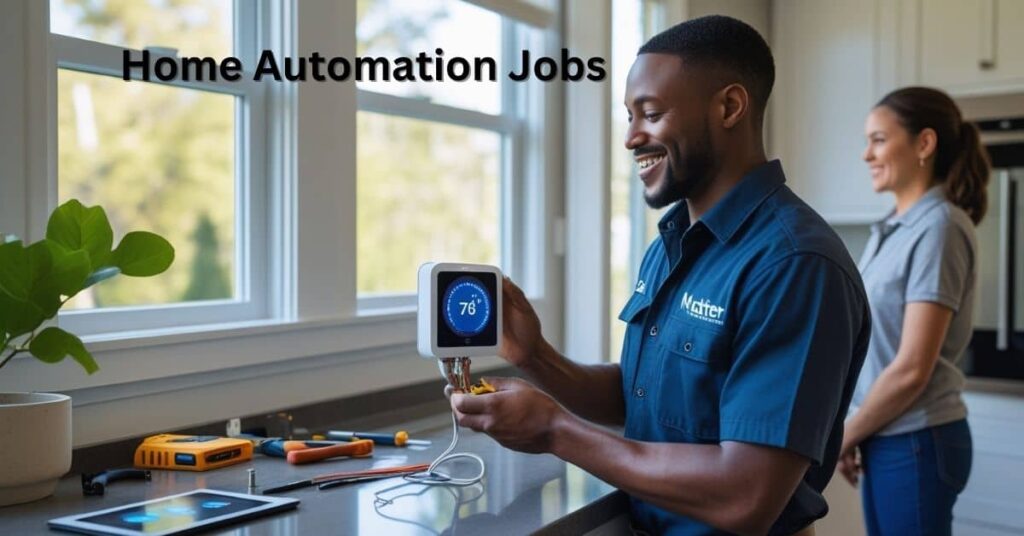It’s 7 a.m. Your alarm wakes you gently, the curtains part to let in sunlight, and your coffee maker starts brewing- all without you lifting a finger. This seamless, automated lifestyle is powered by home automation, a $150 billion industry that’s reshaping how we live. But behind every smart lightbulb and voice-controlled thermostat are people like you– engineers, designers, installers, and innovators- driving this revolution.
Google’s SGE (Search Generative Experience) ranks home automation careers among the top 10 fastest-growing tech fields, with job postings up 45% since 2022. But how do you break into this industry? What skills matter most? And why is it worth your time?
In this blog article, we will answer these questions with real-world examples, expert interviews, and actionable steps to help you land a job- whether you’re a coding whiz, a hands-on technician, or a career changer. Let’s dive.

Contents
- 1 Who’s Hiring in Home Automation? (Spoiler: It’s Not Just Tech Companies)
- 2 How to Break Into Home Automation: Skills, Education, and Hacks
- 3 Why Home Automation Careers Are Unstoppable
- 4 Emerging Trends You Can’t Afford to Miss
- 5 How to Stand Out in the Job Market
- 6 A Day in the Life: Real Stories from Home Automation Pros
- 7 Challenges in Home Automation (and How to Beat Them)
- 8 Final Thoughts: Your Jobs in Home Automation Start Today
- 9 FAQs on Home Automation Jobs
- 9.1 Q: Can I do Home Automation jobs work from home?
- 9.2 Q: Do I need a license to install smart home devices?
- 9.3 Q: What’s the biggest mistake newcomers make?
- 9.4 Q: How do I stay updated in this fast-paced field?
- 9.5 Q: What’s the easiest entry point into home automation?
- 9.6 Q: How important are certifications vs. experience?
- 9.7 Q: Will robots replace home automation jobs?
Who’s Hiring in Home Automation? (Spoiler: It’s Not Just Tech Companies)
The home automation job market is far broader than most people realize. Here’s a breakdown of key employers, roles, and how to stand out:
1. Tech Giants: Building the Brains of Smart Homes
Companies like Amazon, Google, and Apple dominate the smart home space, but they’re not just hiring software engineers.
- Example Roles:
- Smart Home Ecosystem Developer (Amazon): Integrate Alexa with third-party devices.
- UX Researcher (Google Nest): Study how families interact with smart displays.
- Privacy Engineer (Apple): Ensure HomeKit devices protect user data.
Real-Life Story:
After a decade in mobile app development, Priya shifted to Amazon’s Alexa team. “I wanted to work on tech that’s invisible but transformative,” she says. “Now, I code routines that help elderly users control their homes with voice commands.”
Pro Tip: Tech giants value cross-functional skills. A background in IoT protocols (like Matter or Zigbee) or cybersecurity can set you apart.
2. Startups: Where Creativity Meets Cutting-Edge Tech
Startups like Brilliant (smart control panels) and Wyze Labs (affordable cameras) are disrupting the market. They often hire for hybrid roles:
- Product Manager + Customer Support: Lead product launches while troubleshooting user issues.
- Firmware Engineer + Field Tester: Code updates for smart plugs and install them in beta users’ homes.
Case Study:
At Ecobee, a thermostat startup, 30% of hires come from non-traditional backgrounds. “We once hired a musician who built a smart studio lighting system as a side project,” says hiring manager Luis Rivera. “His creativity solved a sensor calibration issue we had struggled with for months.”
3. Security and Energy Firms: The Unexpected Players
Traditional companies are pivoting to smart tech:
- ADT: Hiring “Smart Home Security Advisors” to design integrated camera/alarm systems.
- Schneider Electric: Seeking “Energy Automation Engineers” to link solar panels with home energy managers.
Expert Insight:
“The future of energy is decentralized,” says Dr. Emily Tran, a smart grid researcher at MIT. “Homes will act as very small power plants, and automation experts will manage those automation systems.”
4. Local Contractors: The Unsung Heroes of Home Automation
Small businesses are cashing in on the smart home boom. For example:
- HVAC technicians adding smart thermostat installations.
- Electricians like Carlos Mendez, who rebranded his NYC business as “Wired & Wireless Solutions.” He says, “60% of my jobs now involve setting up Lutron lighting or troubleshooting Wi-Fi extenders.”
Key Takeaway: You don’t need a Silicon Valley address to thrive here. Local demand is surging- LinkedIn shows a 72% increase in “smart home technician” job posts since 2023.
How to Break Into Home Automation: Skills, Education, and Hacks
Whether you’re a recent grad or a mid-career pro, here’s your roadmap:
1. Build These In-Demand Skills
Home automation sits at the intersection of tech, design, and practicality. Focus on these areas:
Technical Skills:
- IoT Protocols: Matter (the new universal standard), Zigbee, Z-Wave, and Thread.
- Programming Languages: Python (for scripting automation), C++ (embedded systems), and JavaScript (smart app interfaces).
- Electrical Basics: Understand circuits, load calculations, and NEC codes (critical for installers).
Soft Skills:
- Adaptability: No two homes are alike. A century years -old farmhouse has different needs than a high-rise condo.
- Empathy: Explain complex tech to non-tech users. Example: “This sensor isn’t spying on you- it’s just making sure your pipes don’t freeze.”
Pro Tip: Certifications like CEDIA ESC- D (Designer) or CompTIA IoT+ validate your skills to employers.
2. Choose Your Education Path
Formal Degrees:
- Bachelor’s: Electrical Engineering, Computer Science, or Human-Computer Interaction (HCI).
- Master’s: Georgia Tech’s “IoT Systems” program or MIT’s “Connected Devices” course.
Alternative Routes:
- Bootcamps:
- Coursera’s Smart Home Automation Specialization (Johns Hopkins).
- Udacity’s IoT Developer Nanodegree.
- DIY Projects:
- Convert a dumb house into a smart one using Raspberry Pi and Home Assistant.
- Share your builds on YouTube or Hackster.io to attract employers.
Real-Life Example:
Mark, a former automotive mechanic, used YouTube tutorials to build a voice-controlled garage door system. He now works as a smart home installer for Vivint.
3. Gain Experience (No Job Required)
- Freelance: Offer smart home setups on TaskRabbit or Thumbtack. Charge
- 50–
- 50–150/hour for installing Ring cameras or configuring Alexa routines.
- Internships: Companies like Lutron and Control4 offer paid internships focused on real-world installations.
- Volunteer: Help local schools or nonprofits automate lighting for energy savings.
Case Study:
Startup Haven hires 80% of its team from freelancers who aced client projects. “One freelancer redesigned a client’s vacation home automation system remotely—we hired her on the spot,” says CEO Dana Lee.
Why Home Automation Careers Are Unstoppable
Still skeptical? Let the numbers and trends convince you:
1. The Market is Growing 3x Faster Than the Tech Sector
- $338 billion by 2030 (Allied Market Research).
- 57% of U.S. households will own at least one smart device by 2025 (Statista).
Drivers:
- Aging populations adopting “aging-in-place” tech (e.g., fall detection sensors).
- Energy crises pushing demand for smart thermostats and solar integrations.
2. Home Automation Jobs Salary– Are Rising Faster Than Inflation
- Entry-Level:
- Installer/Technician: 52,000–68,000/year (BLS 2023).
- Technical Support: 60,000–75,000/year.
- Mid-Career:
- IoT Engineer: 95,000–135,000/year.
- Product Manager: 115,000–160,000/year (Glassdoor).
Note: Specialized roles like Smart Home Cybersecurity Analysts earn up to $145,000/year due to rising data privacy concerns.
3. Sustainability is Fueling Innovation
- Smart homes reduce energy waste by 30–40% (EPA).
- Companies like Tesla and Sense need experts to integrate Powerwalls with automation systems.
Expert Insight:
“The next big wave is AI-driven predictive automation,” says Dr. Alan Chen, AI researcher at Stanford. “Imagine a home that preheats your oven when it senses you’re driving back from the grocery store.”
Emerging Trends You Can’t Afford to Miss
Stay ahead by mastering these developments:
1. Health-Centric Smart Homes
- Devices like Amazon Halo and Withings Sleep Analyzer track sleep patterns, heart rate, and air quality.
- New Roles: Health Integration Specialist, Medical IoT Developer.
2. AI and Machine Learning
- Example: The Ecobee SmartThermostat uses ML to learn your schedule and adjust temps.
- Skills Needed: Data analysis, AI model training, ethical AI design.
3. Matter Protocol: The Universal Language of Smart Homes
- Backed by Apple, Google, and Amazon, Matter ensures devices work seamlessly across brands.
- Opportunity: Matter-certified developers earn 20% more than peers (IoT World Today).
How to Stand Out in the Job Market
1. Build a Killer Portfolio
- Showcase projects like:
- A Raspberry Pi-powered garden irrigation system.
- A retrofitted vintage home with hidden smart tech.
- Use Behance for design roles or GitHub for developers.
2. Network Like a Pro
- Join CEDIA (for installers) or IoTCouncil (for developers).
- Attend CES or Smart Home Connect conferences. Many offer free virtual passes.
3. Target High-Demand Roles
- Fastest-Growing Jobs (2023–2030):
- Smart Home Cybersecurity Analyst (+22% growth).
- Voice Assistant UX Designer (+18%).
- Aging-in-Place Automation Specialist (+27%).
A Day in the Life: Real Stories from Home Automation Pros
Role: Smart Home Installer (Jessica, 29)
- 7:00 AM: Drive to a client’s home to install a Lutron lighting system.
- 10:30 AM: Troubleshoot a Wi-Fi mesh network for a 5,000 sq. ft. smart home.
- 3:00 PM: Train homeowners on using Control4 remotes.
- 6:00 PM: Update certifications via CEDIA’s online portal.
Jessica’s Advice: “Always carry extra Cat6 cables and a voltage tester. Oh, and never assume the client’s Wi-Fi is strong enough!”
Role: IoT Product Manager (Raj, 34)
- 8:00 AM: Sprint meeting with engineers on a new smart lock feature.
- 12:00 PM: Review beta tester feedback on a mobile app update.
- 4:00 PM: Pitch a Matter-compatible product roadmap to executives.
Raj’s Tip: “Learn to speak both ‘engineer’ and ‘marketer.’ Your job is to bridge the gap.”
Challenges in Home Automation (and How to Beat Them)
1. Rapid Obsolescence
- Problem: Devices can become outdated in 2–3 years.
- Solution: Focus on skills tied to standards (like Matter) rather than brands.
2. Privacy Concerns
- Problem: Users fear data leaks from smart cameras or voice assistants.
- Solution: Study GDPR and CCPA compliance. Certifications like CIPP/E boost trust.
3. Complex Installations
- Problem: Older homes lack modern wiring.
- Solution: Partner with electricians or take a course in retrofit installations.
Final Thoughts: Your Jobs in Home Automation Start Today
The smart home revolution isn’t coming- it’s already here. From AI-driven kitchens to self-monitoring security systems, this industry offers endless opportunities to innovate, earn well, and make life easier for millions.
Your Next Steps:
- Skill Up: Enroll in a Coursera IoT course or DIY a smart home project.
- Network: Join a LinkedIn group like “Smart Home Professionals Worldwide.”
- Apply: Tailor your resume to highlight automation skills, even from unrelated jobs.
FAQs on Home Automation Jobs
Q: Can I do Home Automation jobs work from home?
A: Yes! Roles like UX design, software development, and technical writing often offer remote work-from-home automation jobs.
Q: Do I need a license to install smart home devices?
A: It varies. Low-voltage setups (like cameras) may not require one, but electrical work often does. Check local regulations.
Q: What’s the biggest mistake newcomers make?
A: Overlooking soft skills. Tech knowledge matters, but empathy and communication win clients.
Q: How do I stay updated in this fast-paced field?
A: Follow podcasts like Stacey on IoT or newsletters from CNET Smart Home and The Verge.
Q: What’s the easiest entry point into home automation?
A: Start as a technician or customer support rep- many firms offer on-the-job training.
Q: How important are certifications vs. experience?
A: Certifications open doors, but hands-on projects (even personal ones) prove your skills.
Q: Will robots replace home automation jobs?
A: Unlikely! Human intuition is key for customization and troubleshooting.









